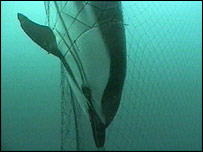|
Yet despite this sophisticated navigation system,
via sound waves and echoes, thousands die each
year when they become entangled in fishing nets.
Marine biologists in the United States now have
an explanation for the paradox.
They believe dolphins only get trapped in nets
when they make a mistake with their navigation.
They become distracted, much as motorists have
accidents when they lose concentration at the
wheel.
"They're not using their sonar all the time," says Dr Andrew Read, of Duke University Marine Laboratory. "They seem to have good mental maps of time and space."
The team monitored how bottlenose dolphins behave around nets using a video camera tethered above a fishing vessel off North Carolina.
On occasions, dolphins got within a body length of the net to snatch mackerel. They sometimes swam back and forth "patrolling" the net, before darting in and removing a fish.
There were many close encounters with the net, but no dolphin became entangled.
The scientists believe dolphins only get trapped when they are unaware of a net or are distracted by other stimuli.
Acoustic alarms
The challenge is to develop some means to alert dolphins to the hazard.
"These types of interactions will increase in frequency in the future as human demand for marine protein increases," says Dr Read.
The most endangered cetaceans:
European harbour porpoise, with about 600 animals left
The vaquita, the world's smallest porpoise: found in Mexican waters, only 500 or so survive.
Maui's dolphin, with probably fewer than 100 animals living off New Zealand.
"We need to develop fishing techniques that are not harmful to marine wildlife."
Acoustic alarms have been tried before with limited success. Furthermore, there is concern that dolphins could learn to associate the noise with an easy meal, reducing commercial fishing catches.
Other options are to make nets more detectable to an echo-locating animal or easier for a dolphin to break, if captured.
"Research into more selective fishing gears - which exclude dolphins and other species being accidentally caught in these nets - is vital," says Louise Heaps, head of the WWF-UK marine programme.
The issue will be discussed at this week's meeting in Berlin of the International Whaling Commission (IWC).
The latest research is published in the journal Biology Letters.
Top
|
